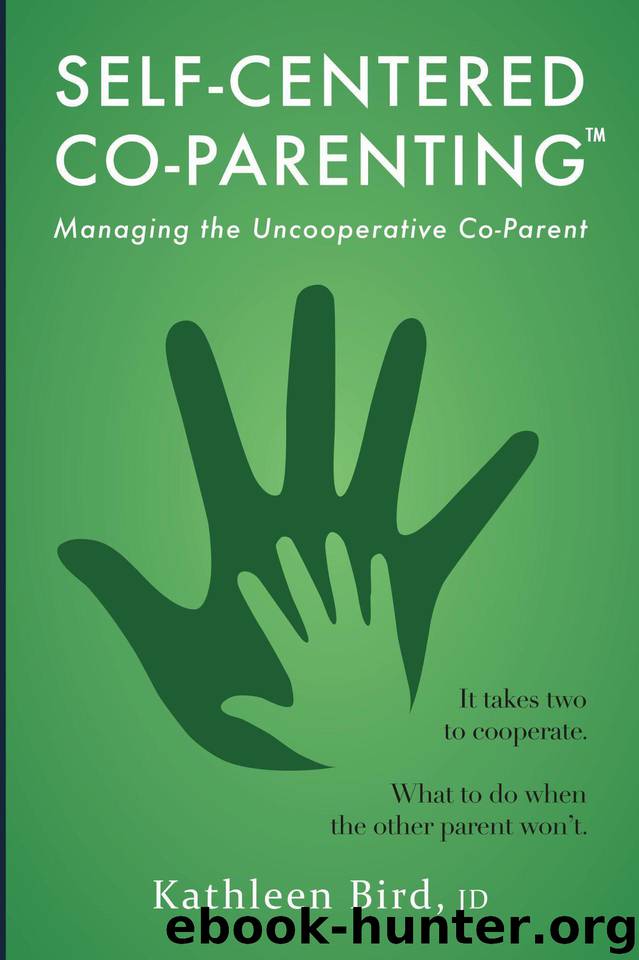Self-Centered Co-Parenting: Managing the Uncooperative Co-Parent by Bird Kathleen

Author:Bird, Kathleen [Bird, Kathleen]
Language: eng
Format: epub
Published: 2017-03-25T16:00:00+00:00
ANALYST
Evaluates using
linear thinking (logic).
Data driven.
VISIONARY
The big picture and
how things might be
TASKMASTER
Task-oriented.
Steps and
who performs them.
SOCIALITE
Connection and
positive interaction.
Conversing with someone who does not share the same thinking preferences requires additional effort and input to make sure communication is effective. While a right-brain processor may crave some understanding and enthusiasm about an idea from a left-brain processor, the left-brain processor needs some understanding that time for analysis and procedure development is also important. While a left-brain processor may assume a decision is just about specifying the procedure to accomplish a task, the right-brain processor needs to feel like a respected team member instead of an underling being ordered around. Incompatible needs both require accommodation to avoid the frustration that leads to disconnecting from the conversation.
There are also differences with peoples’ thinking styles when they operate out of the same hemisphere of their brain. For example, left-brain processors who are more analytical are easily annoyed with left-brain processors who put a priority on completion of task and compliance with rules. One wants time to evaluate all the upsides and downsides and the other wants to delegate and get on with things.
Thinking preferences can give us some idea on what a parent may focus on in a discussion about selecting a sports activity for their child’s participation. The Analyst may focus on the cost and benefit for the child. The Visionary may focus on how this creates future opportunities for the child. The Socialite may be most concerned about how the child will be involved as a team player and treated as an individual. The Taskmaster will assemble information about the practice and game schedule, who will take care of equipment, and how transportation will be handled.
When we are still in an intimate relationship we tend to think this clash in thinking styles is just a lack of caring, disrespect or worse. As the intimacy between co-parents decreases it will become easier to look at the differences dispassionately and develop the patience and willingness required to communicate more fully.
Download
This site does not store any files on its server. We only index and link to content provided by other sites. Please contact the content providers to delete copyright contents if any and email us, we'll remove relevant links or contents immediately.
Should I Stay or Should I Go? by Ramani Durvasula(7667)
The Lost Art of Listening by Michael P. Nichols(7506)
The Rosie Project by Graeme Simsion(6414)
Beartown by Fredrik Backman(5754)
We Need to Talk by Celeste Headlee(5615)
Ego Is the Enemy by Ryan Holiday(5448)
Hunger by Roxane Gay(4928)
Suicide Notes by Michael Thomas Ford(4827)
I Love You But I Don't Trust You by Mira Kirshenbaum(3876)
Mummy Knew by Lisa James(3691)
Not a Diet Book by James Smith(3426)
Crazy Is My Superpower by A.J. Mendez Brooks(3400)
Toxic Parents by Susan Forward(3292)
Girl, Wash Your Face by Rachel Hollis(3282)
The Complete Idiot's Guide to Coping With Difficult People by Arlene Uhl(3149)
The Social Psychology of Inequality by Unknown(3031)
Name Book, The: Over 10,000 Names--Their Meanings, Origins, and Spiritual Significance by Astoria Dorothy(2987)
The Hard Questions by Susan Piver(2975)
The Gaslight Effect by Dr. Robin Stern(2793)
